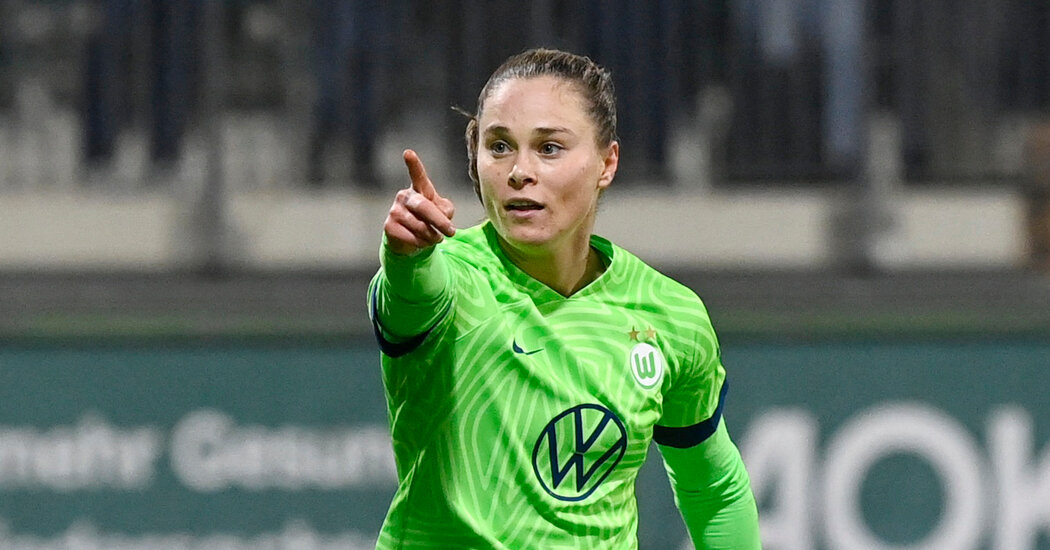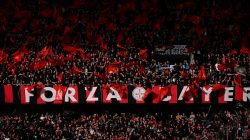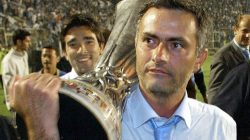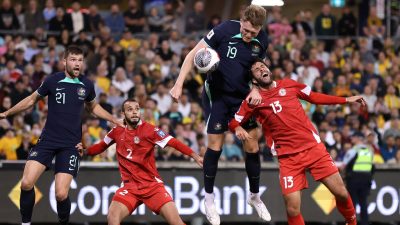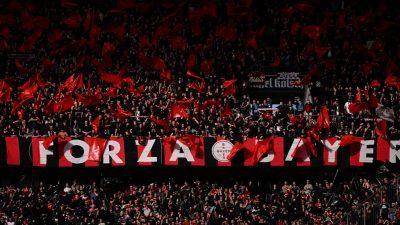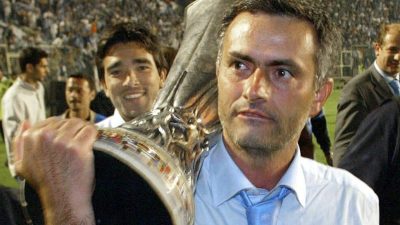The grounds for VfL Wolfsburg’s inferiority complex are thin, at best. This is a club that has been crowned champion of Germany in five of the last six seasons. It has reached at least the quarterfinals of the Women’s Champions League in every year of the competition’s existence. It has made five finals, and won two of them.
Its squad drips with experience and talent: Alexandra Popp, the German talisman, and her international teammates Svenja Huth, Merle Frohms and Marina Hegering; Lena Oberdorf, arguably Europe’s most exciting young player; the seasoned Dutch international Jill Roord, restored to Germany after a couple of years away in England.
By any measure, Wolfsburg is a bona fide superpower, a dominant force domestically and a longstanding contender internationally. And yet even its players seem to have internalized the idea that they are underdogs. A few weeks ago, Popp herself suggested that Bayern Munich — Wolfsburg’s only serious rival for the German title — had started the season as “strong favorites, and that has been the case for the last couple of years.”
It is not quite clear why anyone — let alone Popp, fully aware of the quality of player lining up alongside her on the field — should believe that to be the case. The most obvious rationale is that the Bayern’s reputation, particularly in Germany, is such that it exerts a kind of reflexive gravity: It has sufficient weight that it is capable of bending light, and logic, around it.
As soon as Bayern started to invest heavily in its women’s side, as it did around a decade ago, the natural assumption was that it would win. That is what Bayern does, after all: It wins. It is the club’s calling card, an inevitability threaded into its DNA. And to an extent, that is true. Bayern has picked up three Bundesliga titles since 2015. It has been as good as its word. It has won. It has just not won as much as Wolfsburg.
And yet, somehow, the success of Popp and her teammates has still been overshadowed by the rise of Bayern. In truth, it is hard to shake the sense that Wolfsburg’s location — and what might best be described as its nature — has not worked in the team’s favor.
Wolfsburg is a factory town, its identity bound up with Volkswagen, the city’s major employer and greatest claim to fame. Both the men’s and women’s divisions of VfL Wolfsburg are even now regarded, on some subconscious level, as factory teams.
When the women’s side lifted its last Bundesliga title, Ralf Brandstätter, the chief executive of the car manufacturer, described the players as “personable and successful ambassadors for the club, for Wolfsburg and of course for Volkswagen.” There is not, it does not need to be said, anything especially glamorous about being seen as ambassadors for Volkswagen.
And European women’s soccer is undeniably drawn — at this stage — to glamour (a charge that can just as easily be laid at the men’s game). The Champions League has, for some time, been the private fief of Lyon, a team whose recruitment strategy has long copied that of the Harlem Globetrotters: Its approach has been no more sophisticated than identifying the best players on the planet and working out how much it would take to persuade them to move to the banks of the Rhone.
That model has bled down, not just to Lyon’s great domestic rival, Paris St.-Germain, but to the moneyed plains of England’s Women’s Super League, where Manchester City, Chelsea and, more recently, Manchester United have used their uncontested financial advantages to attract enviable collections of the best players in the world. Bayern has followed much the same blueprint.
Even Barcelona, which prided itself on its homespun approach to success, its idiosyncratic, characteristic style and its inviolable principles, has been unable to resist the pull of women’s soccer’s increasingly frenzied transfer market. Last summer, it made the English midfielder Kiera Walsh the most expensive player on the planet.
In that context, a team like Wolfsburg — largely German, devoid of genuine star names (Popp and potentially Oberdorf apart) and based not in one of Europe’s grand metropoles but in a city frequently caricatured as little more than a production line surrounded by houses — is always likely to struggle for the spotlight.
Increasingly, though, Wolfsburg is becoming difficult to ignore. Tommy Stroot’s side is on course for another Bundesliga title. If it can avoid defeat at Bayern this weekend and it would enter the home straight with a two-point lead at the top of the table. A second straight European semifinal is on the cards, too, after a 1-0 win at P.S.G. this week.
A quiet confidence is taking root among Stroot’s squad that they have nothing to fear, even in the Champions League. “The only thing that can stop Wolfsburg winning it is ourselves,” Popp told FIFA.com earlier this month.
Its victory in Paris, in front of a fervid, boisterous crowd, settled a few of the ghosts of last season, when Stroot’s team froze in front of more than 91,000 fans at Camp Nou, losing to Barcelona, 5-1, in the first leg of their semifinal.
“We experienced the same noise from the crowd at Barcelona last season,” said Dominique Janssen, the Dutch midfielder. “You try to take that experience away with you, and know that it gets easier the more it happens.”
The club might not have lifted the Champions League trophy since 2014, but neither Lyon nor Barcelona looks quite as imposing this time around as they have in seasons past. Like Bayern, Chelsea and Arsenal, there is a sense at Wolfsburg that the field is leveling just a little. It might think of itself as an underdog, but the superteam that everyone has forgotten, in the place that nobody bothers to look, has no reason to feel inferior.
Doing Business in Public
The general rule of thumb, when it comes to prospective takeovers of major soccer teams, is that there is an inverse correlation between heat and light. The more public a suitor, the less likely they are to succeed. Among executives regularly involved in these transactions, the dictum runs that the serious bidders are also the quietest.
All of which, of course, has been upended by the ongoing process to find a new owner for Manchester United. As should have been expected, any interested party was made to sign a “strict” and “binding” nondisclosure agreement before being offered access to the club’s detailed financial accounts. (There is a tautology here, obviously: Nondisclosure agreements are rarely described as “loose” or “really more of a guideline.”)
Still, it might be worth checking the wording. It is not just that the identities of the two leading contenders tussling for the club — Jim Ratcliffe, a petrochemical billionaire, and Sheikh Jassim bin Jaber al-Thani, the son of a former Qatari prime minister and ABSOLUTELY NOT linked to the Qatari state — have become public. It is that everything else has, too.
It has been possible, in fact, to follow this multibillion dollar transaction in surprisingly forensic detail. There were statements to accompany the submission of their bids, as well as ballpark figures of their valuations of the club. There have been details about when and where they have held further talks with United’s current hierarchy ahead of a very public — and completely artificial — deadline for offers. Ratcliffe was even photographed at Old Trafford along with his negotiating team.
News organizations tend not to rail against transparency. The more people want to talk, the better, particularly when it pertains to a club that commands as much interest as United. In this case, though, it might be worth pausing to ask who benefits, exactly, from what would ordinarily be a faintly clandestine process playing out in the open.
For the contenders, it presents a chance to win hearts and minds, and perhaps that is no bad thing. For the Glazer family, the current owners, it is a way to smoke out as much interest as possible, and that is entirely their prerogative. For Raine, the bank that has been tasked with overseeing the deal, it is a chance to drive up the price, and by coincidence its commission.
Everyone involved, in other words, is using United — a club that regards itself, not without cause, as the biggest sporting institution in the world — for their own ends. United is reduced to a mere asset, a trinket to be haggled over and horse-traded, a passive participant in the proxy wars of billionaires. And that, when it comes down to it, is about as good a definition of modern soccer as you will find.
“Failure”
Julian Nagelsmann always wanted to be Bayern Munich manager. It was the job he coveted more than any other during his meteoric rise, back when he was European soccer’s coming force, its baby-faced managerial prodigy, an outsider who was overturning conventional wisdom of what a coach should look like, what steps they needed to take, how old they really ought to be.
When he left his first job, at the equally neophyte Hoffenheim, for RB Leipzig, it was with the express purpose of positioning himself to take charge at Bayern. Leipzig was his designated intermediate step, the place where he would go to get from here to there, to where he always wanted to be.
And though the move worked, he never felt quite like a natural fit with Bayern Munich. The images, early on in his tenure, of him scooting around Bayern’s training facility at Sabenerstrasse on a hoverboard felt somehow jarring, a Silicon Valley tech bro on vacation at Neuschwanstein. There always seemed to be just a hint of unease in the air: a hunt for a mole here, an unwarranted, unedifying outburst there.
If the timing of his demise is curious — he was fired on Friday, with his team in second place in the Bundesliga, a point behind its next opponent, and with a Champions League quarterfinal on the horizon — then the fact of it was not. Bayern places great stock in having a coach whose face fits. It is a shifting, vague criterion, but one that condemned him in the end. Nagelsmann never felt right, not quite.
His solace, of course, is not simply the Bundesliga title he picked up in his first and only full season in Munich — proof that nobody fails at Bayern, not in any meaningful sense of the word — but the fact that he will be able to parlay that experience into something else soon enough.
Bayern, it turns out, will not be his final destination. Nagelsmann will now be a contender for any of the handful of elite jobs that becomes available. Once a manager has broken through that ceiling, after all, it quickly transforms into a floor. The best evidence for that is the man who is replacing him: Thomas Tuchel, fired by Paris St.-Germain and fired by Chelsea, but hired in an instant by Bayern. For Nagelsmann, Munich will be just another step along the way.
Correspondence
We are moving away from the many and varied failings of penalties and onto socks this week, courtesy of Shawn Donnelly. “What’s the deal with these Premier League players’ socks?” he asked, in the tone (I am assuming) of Jerry Seinfeld. “Half of them seemed to be ripped up in the back. Is this a new style, or can the sportswear brands not produce a sock strong enough for the rigors of the Premier League?”
This is a good question, and in a rare stroke of good fortune, it is one I can actually answer. It is to do with reducing pressure on the calf muscles. Kyle Walker, the Manchester City defender, seems to have been the pioneer in this particular realm of what we may as well, for want of a better word, call science, and now it is almost de rigueur.
Moshe Arenstein, meanwhile, makes a perfectly coherent point of logic. “As we enjoy this great part of the year with amazing Champions and Europa League games, why on earth would the final game be just one game? Isn’t the best part of this tournament the home and away? Do we not deserve a final that has two games as well?”
That, of course, was exactly how one European tournament functioned until relatively recently: the UEFA Cup, the forerunner of the Europa League, only switched to a single, showpiece final in 1998. (The Intercontinental Cup, the predecessor of the Club World Cup, ran as a home-and-away affair until 1980.)
This newsletter is not above a dash of misty-eyed nostalgia, of course, but on this one I err on the side of modernity: there is an appeal to a two-legged final, but there is no drama greater than a one-and-done, surely?
And Tom Gantz, rightly, takes issue with my description of dead-rubber group stage games in the expanded men’s World Cup as being “pointless soccer.”
“Pointless to whom, exactly?” Tom asks. “The chance to watch the best soccer players once every four years is something I won’t pass up even if the outcome of every game doesn’t actually affect progression in the tournament.”
I will cede that point as graciously as possible: No soccer match is truly pointless, is it? And I say that as a man who once attended a group stage game in a minor cup competition in which both teams had already been eliminated, and yet it ended in a penalty shootout anyway.
Sumber: www.nytimes.com
